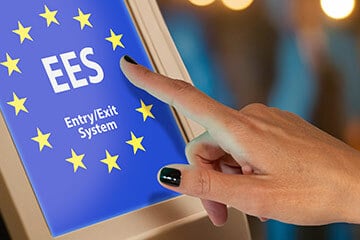Planning a trip to Europe? Before you get to the fun part, make sure you've got the important stuff covered first. From entry requirements and must-have documents to travel insurance, here's what you need to know to get prepared and travel with confidence.

What documents do I need before I travel to Europe?
Here's a list:
- Passport: Check if your passport is still in date - you might have to renew it before you travel!
- Health insurance cards: Sign up for a Global Health Insurance card.
- Visas: It can vary from place to place, so double check if you'll need a visa for your destination.
- The right car insurance for the country you're visiting: Planning to drive? You'll also need to find out if you need an international driving permit.
- An animal health certificate: You need this if you're taking pets abroad.
- Your travel insurance policy information: Keep this info with you in case you need to make a claim, including the emergency 24/7 helpline number.
One last thing - use our holiday checklist to make sure you've packed everything you need for your trip!
Is my British passport still valid after Brexit?
Yes, it is! But, you'll just need to make sure that your passport is:
- Less than 10 years old
- Have at least 6 months left on them during your trip
Need some help? Our Passport Checker can tell you if your passport is valid for your destination. And, if it's not, we've got step-by-step guidance on how to renew it.
Travelling to Ireland
Off to the Emerald Isle? Brits don't need to show a passport to enter Ireland. But, you will be asked to prove your identity at your point of travel - like at the airport or ferry. This can either be with your passport or official photo identification, like your driving licence.
What's the difference between GHIC and EHIC?
The UK Global Health Insurance Card (GHIC) replaced the European Health Insurance Card (EHIC), when the UK left the European Union.
The GHIC lets you get state healthcare in Europe at a reduced cost or sometimes free if you need it. You can carry on using your existing EHIC until it runs out. You can find the expiry date on the card.
There's no cost to apply for a GHIC. You can apply for a GHIC, and find out more about them through the NHS website.
Top tip
Don't rely on your EHIC or GHIC card just because it'll give you state supplied healthcare. Without the right policy, you could still end up with a large medical bill. Plus, it's a requirement of most travel insurance policies.
Can I use my EHIC or GHIC in Switzerland, Norway, Iceland or Liechtenstein?
Yes, you can use your GHIC or EHIC to access necessary, state-provided medical care in all of these destinations! For specific information, you can view each country's travel advice page on GOV.UK.
Do I need a visa to travel to Europe?
Nope. If you’re going on holiday for fewer than 90 days, you shouldn’t need a visa to travel to Europe.
What do I need if I'm driving to Europe?
You'll need a few things:
-
A UK sticker displayed clearly on the rear of your vehicle.
-
If you have a paper licence or are travelling to a non-EU country, you may need to get an appropriate international driving permit (IDP). If you have a photocard driving licence, you don’t need an IDP for driving in the EU!
-
Your vehicle log book, make sure this is up to date.
-
A valid car insurance policy and proof of it, like your Certificate of Motor Insurance.
-
An emissions sticker if you're travelling to a European country that needs one. Check this and apply a few months before you travel!
Top tip
All UK car insurance policies provide basic third-party cover for most countries in Europe. So, you shouldn’t need a green card as proof of insurance! But if you want more coverage, you may want to discuss getting comprehensive cover with your insurance company. You can find a full list of countries where you may need a green card on the government website.
Compare car insurance quotes
What travel insurance do I need to travel to Europe from the UK?
A standard travel insurance policy for Europe should have you covered for the unexpected, including:
-
Medical cover. Your EHIC or GHIC is great for accessing basic medical care, but it won't help if you need to be flown home in an emergency. Travel insurance steps in to cover those costs, so you're not left with a hefty bill.
-
Cancellation and curtailment. Sometimes, plans change! Flights get cancelled, or you might have to cut your trip short due to an emergency. Travel insurance can help you recoup your costs.
-
Baggage cover. Lost, stolen or damaged luggage? It happens, even on short trips. Travel insurance can help you replace your belongings so you're not left stranded without your essentials.
-
Losing or getting your passport stolenabroad can be a nightmare! But, the right policy can help with the cost of replacements and any extra expenses while you wait.
-
Third-party liability. If you accidentally injure someone or damage their property, this can help cover legal costs.
Planning anything else?
Depending on your plans, you might want to consider policy add-ons for extra peace of mind. These can offer enhanced coverage for a little extra cost - perfect if you're planning something beyond a standard break.
Here's a few that might be worth thinking about:
-
Winter sports cover: Great if you're heading off for skiing, snowboarding or other snowy adventures.
-
Adventure sports cover: Covers activities like scuba diving past a certain depth, bungee jumping and paragliding.
-
Cruise cover: Ideal for European cruises - it can offer tailored cover for missed port departures, cabin confinement and more.
Taking pets abroad
Want to take your furry friend abroad with you? If you've got a pet passport issued in the UK, it isn't valid for EU travel anymore.
Instead, you'll need to:
- Get your pet microchipped
- Get a rabies vaccination
- Take your pet to the vet 10 days before you travel to get an Animal Health Certificate (AHC).
If you’re travelling to a non-EU country, you'll need to complete an export application form and get an export health certificate. And, keep in mind - if you’re taking your dog to Finland, Ireland, Northern Ireland, Norway or Malta, they need a tapeworm treatment.
For more info, visit GOV.UK.
Do I need to pay to travel to Europe from the UK?
Nope! Currently, you don't need to pay anything to enter Europe.
But from late 2026, you'll need to apply for the European Travel Information and Authorisation Scheme (ETIAS) - a visa waiver that costs €7 (£6) to get. It'll be valid for 3 years, or until your passport expires.
Want to learn more about this planned change? We can help with that - our ETIAS guide has everything you need to know.
Also: You might have to pay tourist tax, depending on where you're travelling. This is normally added to your accommodation bill. You can see an estimate of how much tourist tax you might pay by using our tourist tax checker.
Do I need to take a Covid test if I'm travelling to Europe?
No, you won't need to worry about getting tested for your trip! That's because there's no current restrictions around Covid for travel to Europe.
Even so, it’s worth checking entry requirements before your departure date - just in case. You can do this at GOV.UK. Easy peasy!
Compare travel insurance







